The introduction of the Goodfellow Symposiums offered important opportunities for GPs to gain access to continuing medical education, and a new avenue for the Goodfellow Unit to restore its position as a leader in primary health care education. By the early-2000s, the Goodfellow Unit short courses ‘were starting to get into trouble’.1 The popularity of the courses had declined amidst competition from the free courses Primary Health Organisations organised for their members. Ross McCormick, the Director of the Goodfellow Unit from 1998 to 2008, decided to cease running the short courses for twelve to eighteen months. While he felt compelled to eventually resume the short courses as ‘it’s part of our core business’, the possibility of hosting annual Symposiums was a more suitable alternative.2
The decision to launch the Goodfellow Symposium was a result of several important conversations that took place simultaneously across the early-2000s. Bruce Arroll explained that one of his colleagues had flown to Wellington to attend a weekend course based in a private hospital, and ‘I thought, “well this is nuts. People shouldn’t have to fly, this is the biggest city in the country, surely we can put that on”’. He subsequently spoke with Tim Kenealy, a GP and Goodfellow Unit CME Coordinator, about developing a similar event for GPs in Auckland, who proposed the idea to Ross McCormick.3 Around the same time, McCormick received a phone call from Andrew Wong, the managing director of Mercy Ascot. Andrew Wong had attended a Symposium in Wellington and proposed the Goodfellow Unit organise a similar event.4
Together, they all identified the lack of a Symposium in Auckland as a significant gap in continuing medical education, and one that the Goodfellow Unit should remedy. The first Goodfellow Symposium took place at the University of Auckland Tamaki Campus in 2006 with Mercy Ascot as its premier sponsor.
Ross McCormick on launching the Symposiums
Peter Huggard became responsible for organising the Goodfellow Unit Symposiums when he took over the role as Director in December 2008. By the late-2000s, the Symposiums had become one of the Unit’s main outputs and he recalled, ‘we started planning for the next year the week after each Symposium finished’. As the first Director who had not trained as a physician, Peter was determined to expand the Symposiums to include others working in primary health care. He aimed to increase collaboration ‘to reflect what’s a reality – that people are not working in isolation’.5
This involved establishing discounted registration fees for members of the Nurse Practitioners’ Association, inviting community pharmacists to attend the events, featuring staff from St John Ambulance Service as presenters and exhibitions, and hosting the 2010 and 2011 Symposiums in partnership with the Accident and Medical Practitioners Association.
Rose Lightfoot on nurses at the Symposiums

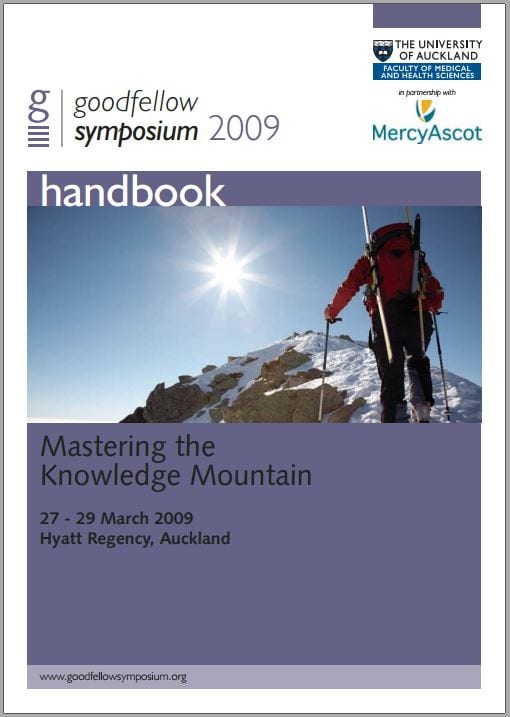
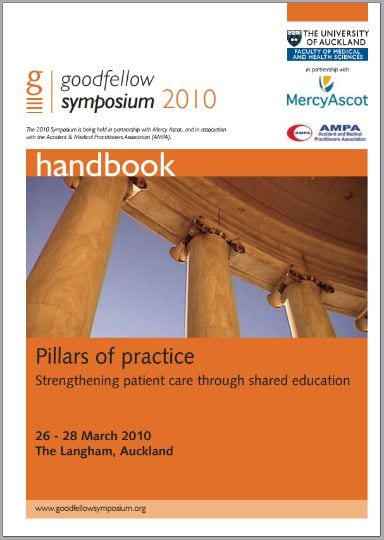
Handbooks provided by The Conference Company
The entertainment was particularly memorable. Peter had attended a conference on the health of physicians in Sydney that had featured a compulsory salsa dance class. He explained, ‘you’ve had this very emotionally heavy conference all day and you make a fool of yourself trying to do a salsa dance, it was wonderful’. Peter had completed his PhD thesis on the emotional wellbeing of hospital-based doctors and was especially attuned to the importance of such outlets. Shortly before he took over as Director of the Goodfellow Unit, he served on the organising committee for the 2008 Symposium with the theme, Looking After Our Patients and Ourselves. The Symposium featured a pre-conference workshop on Wellbeing for Doctors, and hosted sessions on Laughing Yoga, exercise, and meditation between presentations.
In 2009, Peter introduced country dancing lessons to the Symposiums and featured a different kind of interactive performance each subsequent year. These included an ABBA dance competition by the top drag performing duo Buffy and Bimbo, a samba lesson by Dancing with the Stars winner Aaron Gilmore, and a belly dancing session.6
Peter Huggard (far right) introduced a country dancing session during the third year of the Symposiums.
The Symposiums were an important source of income for the Goodfellow Unit. Yet the organisers continued to face competition from the free education that Primary Health Organisations offered. Bruce Arroll recalled that when he took over the role of the Director in 2014, the number of delegates had started to decline. UniServices, which manages contracts and projects at the University of Auckland, suggested the Goodfellow Unit reduce the frequency of the Symposiums to every second year. Yet Bruce felt ‘either we do it every year and do it properly or we stop doing it’. Along with Selena Armstrong, the general manager of the Goodfellow Unit, Bruce developed strategies to reduce costs and to attract more delegates. They changed the entire programme, which ‘went from a clinical one with a bit of research through to just a pure blood and guts thing’. They aimed to offer the attendees with skills they could implement almost immediately, with the theme ‘Skills for next Monday’.7
Overhauling the entire programme carried considerable risks, and Bruce remembered having a ‘sleepless night every night of the year’ hoping the new programme would be a success.8 Nevertheless, the ‘sector realised something had happened and the programme had changed completely. So the numbers went up’. The record number of attendees from 2015 reflects the success of the ‘blood and guts’ approach. In 2016, the Symposium moved to its current location at the Vodafone Events Centre in Manukau, having outgrown the Viaduct Events Centre in Auckland Central.
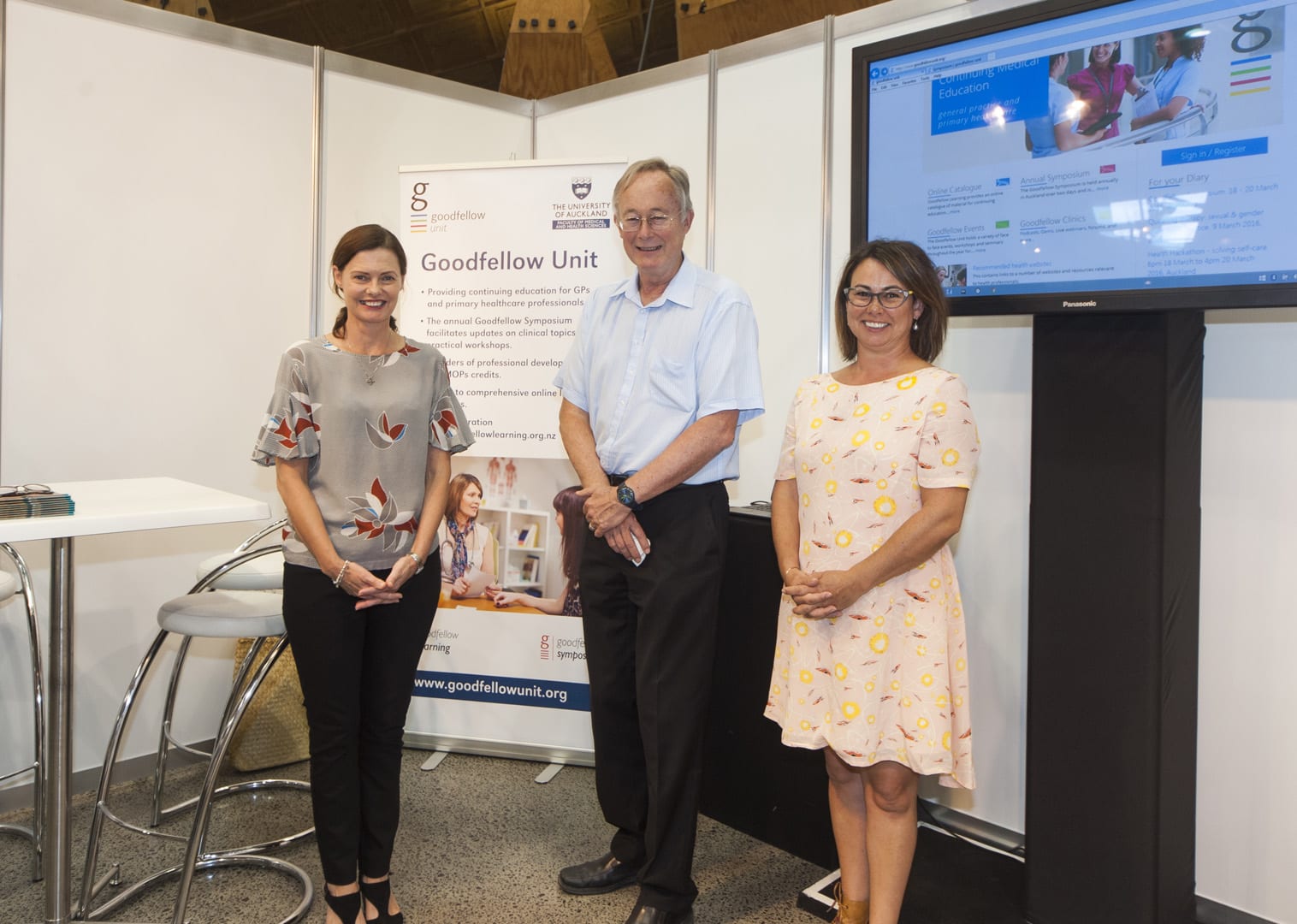
Bruce Arroll and Selena Armstrong, then Gener

Goodfellow Unit Report to the Board of the Goodfellow Foundation, May 2018
Ensuring the content of the presentations were of immediate relevance to conference delegates was an important part of their emphasis on ‘skill for next Monday’. Yet the staff also wanted to ensure the delivery of the presentations appealed to their audience. Bruce was especially inspired by a speech David Lange had delivered in 1976 to students in the University of Auckland’s School of Medicine. Bruce and the other organisers decided only to invite speakers that other staff members had watched present and could attest to their presentation skills. In 2016, the organisers asked presenters to deliver short TED-style presentations and allow more time for questions, rather than the standard fifty-minute presentations.
Pharmacists were particularly positive about the distance the Goodfellow Symposiums had from pharmaceutical companies. Pharmacists remained a minority at the conference, with about ten pharmacy delegates attending the 2017 Symposium. Yet those who attended attested that ‘Getting hard data on what should be prescribed and when and knowing the information is best practice rather than just from the latest study or what drug reps are currently encouraging, makes the Symposium worthwhile’.9
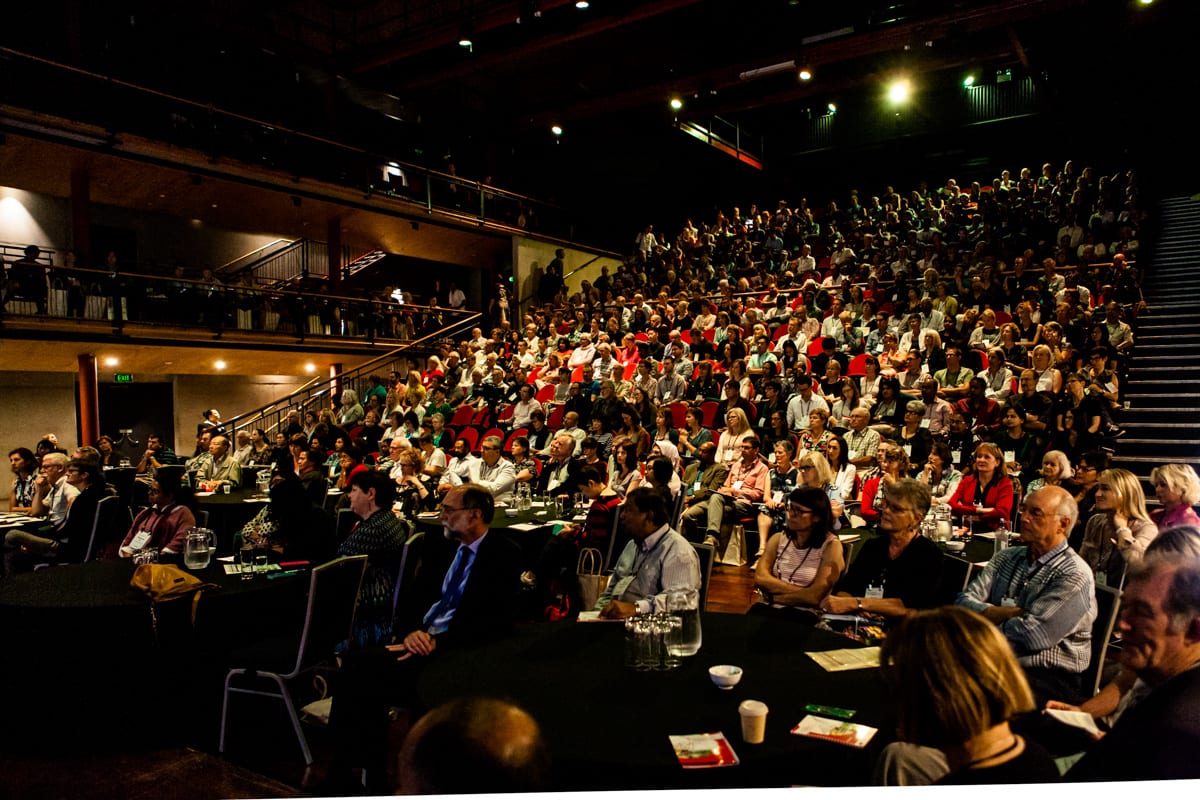
Attendees at the Goodfellow Symposium in 2017
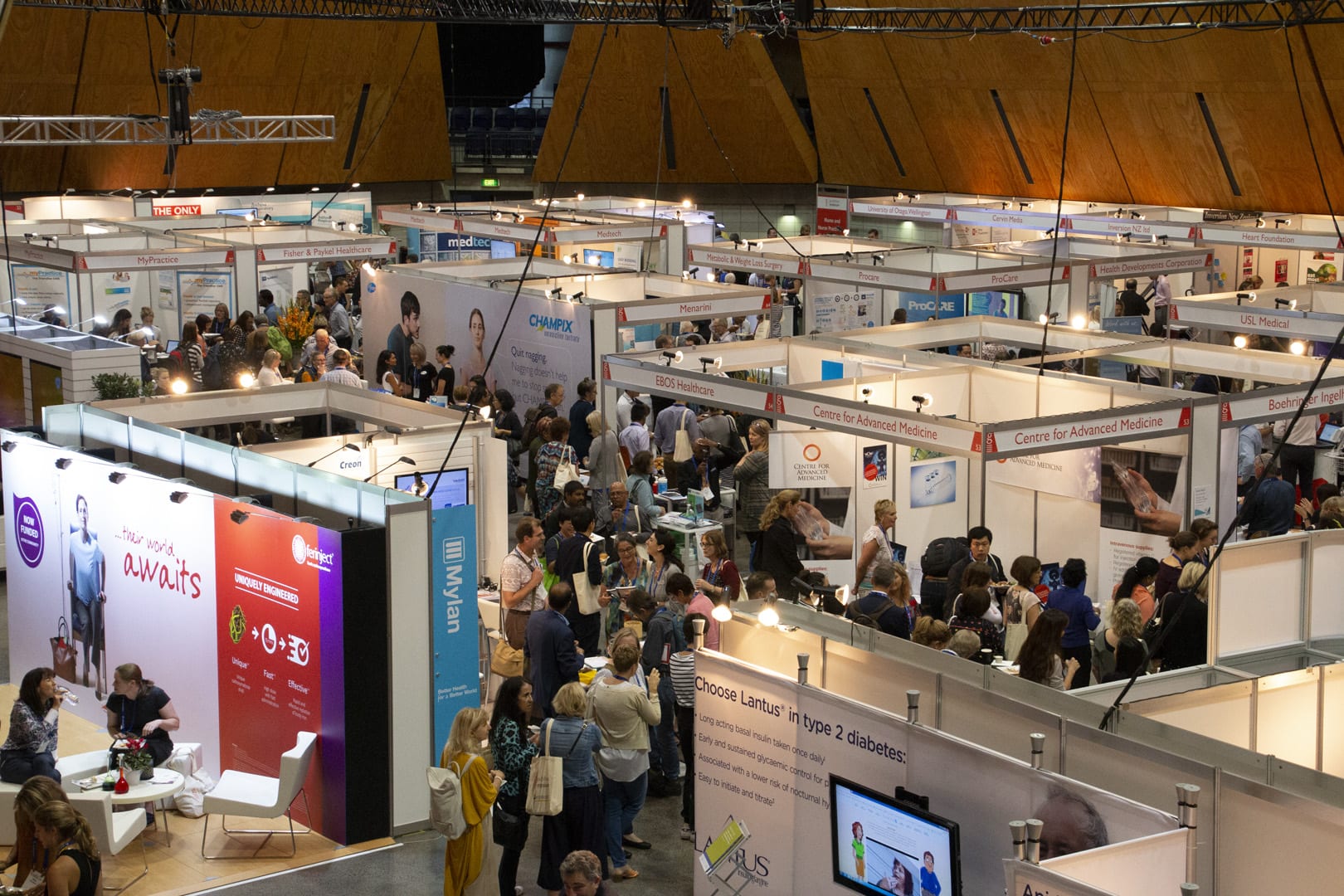
Attendees at the Goodfellow Symposium in 2018
Pharmacists were particularly positive about the distance the Goodfellow Symposiums had from pharmaceutical companies. Pharmacists remained a minority at the conference, with about ten pharmacy delegates attending the 2017 Symposium. Yet those who attended attested that ‘Getting hard data on what should be prescribed and when and knowing the information is best practice rather than just from the latest study or what drug reps are currently encouraging, makes the Symposium worthwhile’.9
The Symposiums also offer an important opportunity to maintain connections with former staff members of the Goodfellow Unit. Several staff members who have been involved with the Unit at various points over its forty-year history have returned to contribute to the annual events. Rose Lightfoot, the former project manager of Tobacco, Alcohol and Other Drugs, facilitates sessions with nurse practitioners at the Goodfellow Symposiums.11 Brian McAvoy, who was the first Elaine Gurr Professor of General Practice from 1989 to 1994 and worked alongside Phil Barham, also contributes to the Symposiums and teaches attendees about addiction medicine.12
The next Goodfellow Symposium will take place at The Vodafone Events Centre in March 2019.
- 1. Interview with Ross McCormick, 2 November 2019. ↩
- 2. Ibid. ↩
- 3. Interview with Bruce Arroll, 19 November 2018. ↩
- 4. Interview with Rose Lightfoot, 21 November 2018. ↩
- 5. Lucy Ratcliffe, ‘Sharing CME a Pillar of Practice’, New Zealand Doctor, 26 March 2010. ↩
- 6. Interview with Peter Huggard, 22 November 2018. ↩
- 7. Interview with Bruce Arroll. ↩
- 8. Ibid. ↩
- 9. Keira Stephenson, ‘Shout Out to Pharmacists Attending Goodfellow Symposium’, Pharmacy Today, 28 March 2017. ↩
- 9. Keira Stephenson, ‘Shout Out to Pharmacists Attending Goodfellow Symposium’, Pharmacy Today, 28 March 2017. ↩
- 10. Interview with Rose Lightfoot. ↩
- 11. Interview with Brian McAvoy, 2 November 2018. ↩

